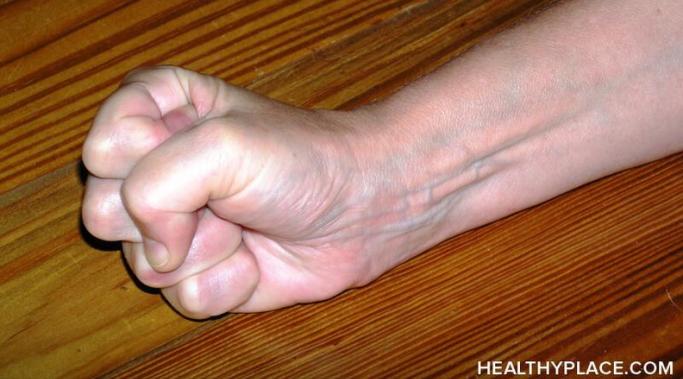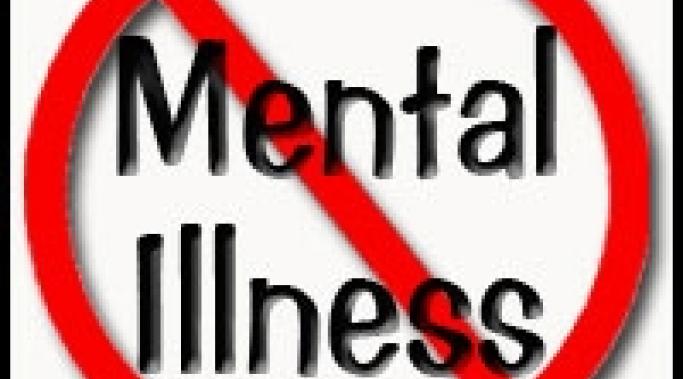On a normal day, I could have walked away.
Very few of my neighbors in this mental illness treatment facility are violent. That said, one of my neighbors, who has a history of aggression, recently started cussing me out with a mix of b-words and f-bombs, then challenged me to a fistfight. I took off my glasses and said I was fine with that as long as she threw the first punch. She told me ""#$%!, you throw the first punch, I ain't crazy!" and a social worker came and broke it up.
I went to my apartment and immediately had an asthma attack (Physical Disorders with Panic-Like Symptoms). I also punched a wall, bruising three knuckles. Not my finest moment, and not normal for me. But afterwards, I thought about what should happen when violence in mental illness treatment facilities becomes a problem.
BPD and the Law
I was raised Christian right-wing conservative, complete with the anti-government aid viewpoint—I was taught this was socialism, which every good American knew meant “communism,” which every good American knew was evil, anti-Christian and would enslave us all. I also sincerely believed that people on government aid should just get a job and stop mooching off the taxpayers.
My attitude has since changed, largely because I've learned three things people don't know about Social Security disability.
I'll be honest, I'm a little worried about my neighbors. I live in an apartment complex for adults with severe mental illness; it's one step above a group home. This leads to some quite strange interactions, which raise the question of "When does the right to privacy hurt?"
On Monday, Aaron Alexis went into the Washington Navy Yard and started shooting. Within hours his mental state was questioned--we're now learning Aaron Alexis had a psychiatric history and "slipped through the system". While there is no definite link between mental illness and a risk of violence, there is a pattern emerging between mass shooters and inadequate mental health treatment. (read: Should People with a Mental Illness have Firearm Rights?) There but for the grace of God, go I.
To say I was in a foul mood was an understatement. I'd been escorted by the police to the Midtown Community Mental Health Center's Crisis Invtervention Unit (CIU). I'd been waiting for a few hours to talk to a therapist, which is annoying even when psychiatric symptoms haven't flared up. But I was in for a surprise.
As I write this, my sobriety is shot to the Nether Regions. I'm once again fighting my battle against alcohol relapse and cravings. Which got me thinking, what do I wish people understood about addiction?
Sometimes statistics speak for themselves. In 2005, PBS aired a documentary about psychiatric treatment in the correctional system. Here is a breakdown by state:
In 1841, a Boston schoolteacher named Dorthea L. Dix became interested in many social reforms, especially the treatment of the mentally ill. One Sunday, she went to the House of Correction in East Cambridge to hold a Sunday school class for female inmates. She was revolted by the filth, neglect, and despair of the mentally ill people who were held in the jail. She persuaded local authorities to improve the conditions, and began touring Massachusetts to see what needed to be done. In 1843, she wrote a tract called Memorial to the Legislature of Massachusetts, which called for drastic reforms.
The recent murder-suicide involving Kansas City Chiefs linebacker, Jovan Belcher, calls attention to the issue of domestic violence. While it is unclear if Belcher was an abuser, recent reports indicate that he and girlfriend, Kasandra Perkins, were in counseling for relationship issues. So it makes domestic violence a reasonable topic for discussion. I've noticed that mental illness is often a factor in domestic violence.
Regardless of who wins this year's elections, I am nervous. Health insurance reform hangs in the balance. If you ask me why I'm worried about that, it's because health insurance as it currently stands has a legalized discrimination policy when it comes to mental illness, especially ones like borderline personality disorder (BPD). There are two ways the discrimination is encoded: in pre-existing conditions clauses and lack of mental health parity.









